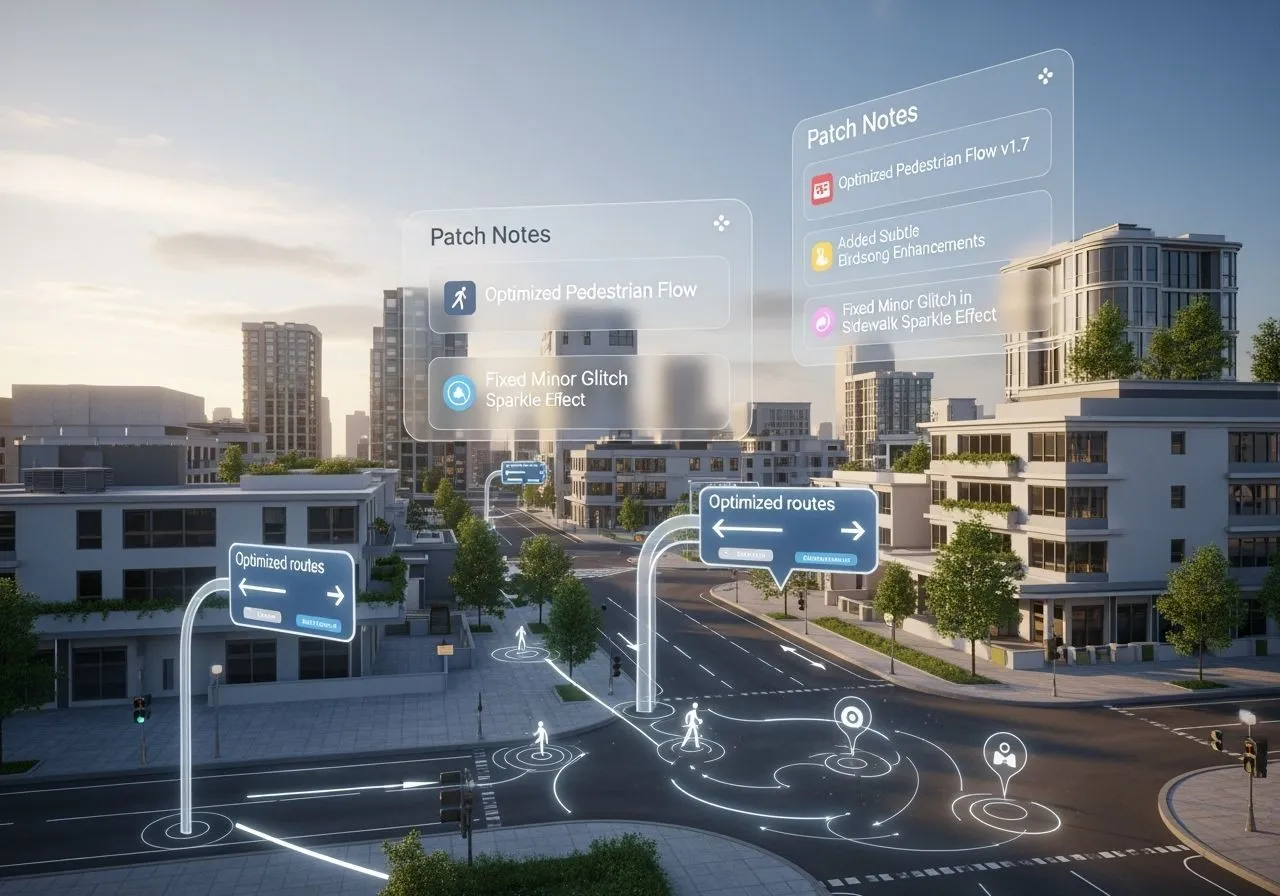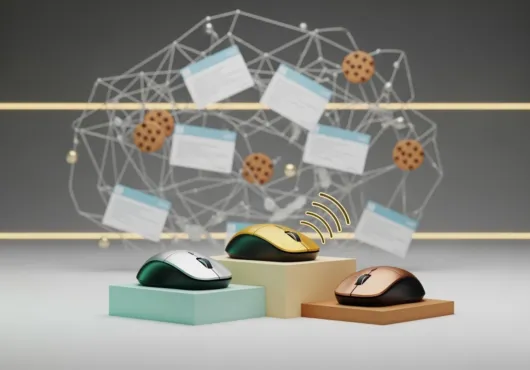Progress is nice until it’s just growth wearing a lanyard. Reality Patch v2.13 is already live; consent, as usual, will be applied retroactively. Read the notes, then mess with the defaults.
You wake up and the sky is 9% bluer. Not because the atmosphere made a decision—because a dashboard did. The horizon has that faint glow of a notification you can’t clear. Somewhere, a product manager marks your morning as “adopted.”
The world now ships like software—models patch how you move, buy, date, and believe.
The changelog is written by incentives, not wisdom.
You can jailbreak reality with intentional friction, local-first choices, and a daily weirdness budget.
“Your life has been updated while you were sleeping. See what’s changed.”
The routes on your map feel a little safer, a little cleaner. Your playlist nails the vibe you didn’t know you had. News feels oddly calmer, as if outrage has been put on a cooldown. You didn’t agree to any of it, and you didn’t have to. That’s the trick: consent is now a setting you discover after the update ships.
Welcome to Reality Patch v2.13. It’s been rolling out for years. You just finally noticed the release notes.
The World Ships on Fridays Now
Look around. Navigation quietly sanded off the detours that turn into stories. The route that used to take you past the chaotic street market—gone. The “faster” option wins and, somehow, you arrive emptier. Grocery apps choreograph you down partner aisles and call it personalization. Your search result is a tiny climate—humidity set by a model, visibility reduced to “commercially viable.”
Music behaves the same. Old-school crate digging—the weird record that reorients your taste—has been downgraded to an edge case. The feed is smoother now, like a river with the rocks removed. Great for boats. Bad for conversation on the shore.
The physical world is still analog; its meaning is software. What we notice, how we label it, whether it “counts”—all patched in the background so the graph moves up and to the right.
Who Writes the Changelog (Hint: Not You)
No one sits down to write “Reality: The Official Notes.” The author is incentives. Ad markets, safety optics, conversion targets, executives afraid of churn. Every patch claims to protect you from friction—traffic, boredom, awkwardness, conflict. The effect is a velvet rope around anything unprofitable.
Ethics becomes a brand of performance art. If a fix increases ARPU, it graduates to morality. If it doesn’t, it waits in backlog purgatory until someone needs a keynote.
Meanwhile, the “opt-out” switch exists—somewhere. It’s a toggle inside a submenu wearing a moustache. You’re free to find it, assuming you can remember why you opened Settings in the first place.
Bugs We’ve Rebranded as Features
Attention fragmentation? That’s “multitasking.” You boot your brain with ten tabs and call it being informed. Latency of truth? We’ll get the correction out after the meme has done its job. NPC syndrome? People behave like scripts because the systems reward predictability—be legible or be invisible. And auto-moderated empathy? Customer care that paraphrases your pain and escalates it to category D4 (refund, partial, perform sincere apology).
These aren’t just bugs; they’re features we learned to thank. They save time. They reduce the sharp edges that make days feel real. They let you glide past the discomfort where growth happens. They’re convenient. That’s why they survive.
Rollbacks, Hotfixes, and Soft-Forks of Reality
Sometimes a patch backfires. The city optimizes foot traffic and wonders where its culture went. The platform throttles “controversy” and ends up sanding language into oatmeal. Cue the rollback: a statement, a toggle, a promise to listen. And yet—notice the baseline rarely returns. What used to be normal becomes “compat mode.” You can still select it, but the defaults keep switching back when you’re not looking.
We’re living across soft-forks now. Home v2.11 (pre-filter) and Home v2.13 (safely dull) occupy the same map. You and your neighbor walk the same street and experience different weather. You both swear you’re seeing reality. You are. Just different branches.
Reality Patch v2.13 — Leaked Changelog
Navigation: “Safer Route” now excludes streets with non-partner retailers.
Newsfeed: Introduced a 2–4 hour delay on outrage clusters. Let it cool before it cooks you.
Dating: Auto-recalibrated your “type” after three swipes to boost conversation starts by 18%.
Commerce: Shelf order optimized so choices feel abundant while outcomes remain the same.
Culture: Niche discovery tuned down to prevent churn from taste shock.
Support: Bots now mirror your last three words to simulate understanding. Simulate understanding…
(Yeah, it’s satire. It’s also Tuesday.)
The Human Changelog (How to Jailbreak)
Reset defaults. Kill autoplay. Turn off “optimize route.” Disable “recommend for you.” Surprise requires room to happen.
Add friction on purpose. Batch notifications. Use a “dumb hour” each day where your phone is a camera, nothing else. Slow tools thicken attention.
Go local-first. Maps that know streets, not segments. Music from humans you can text. News with names.
Fund a weirdness budget. Commit 10–20% of choices to non-optimized outcomes. Take the “wrong” train. Read the second page of results. Buy the record with the ugly cover.
Externalize memory. Keep your receipts for reality—paper notebooks, annotated photos, playlists. Don’t let the feed be your historian.
You won’t break the world. You’ll break the spell.
Future Release Notes (Pin These Before They Ship)
Search will get context surge pricing—truth costs more during panic, which means panic gets cheaper to create. Platforms will test regional ethics toggles the way they A/B button colors: stricter here, looser there, “monitor sentiment.” Your devices will learn emotion smoothing, adjusting light and sound to keep sentiment in the green; sadness will be treated like a UX regression. And memory? Expect personal DRM—a friendly offer to “secure your recollections” behind encryption, watermark included. Convenient. Monetizable. Forgettable.
This sounds dystopian until you remember: pieces of it are already in production. We’re not forecasting; we’re reading the backlog.
A Small Confession
I like some of the patches. I like calmer feeds, safer night walks, playlists that don’t waste my commute. I like not having to be a contrarian to feel alive. That’s the seduction: comfort draped over control. The answer isn’t to LARP as a prepper or destroy your phone with a hammer you bought ironically. The answer is more specific: build taste on purpose, and defend it like it’s contraband.
Taste is the last unsupervised algorithm you own. It’s also exhausting to maintain. That’s why systems take it from you and sell it back as convenience. Guard it. Tend it. Feed it with people, not just content.
Patch Etiquette for Living Things
When software updates, we assume someone tested it. Living things deserve at least that much ceremony. If you’re going to update a city, a classroom, a relationship, a mind—publish notes. Say what changed, who benefits, who pays. Offer a rollback. Admit when you shipped fear by mistake.
Update complete. Your consent will be applied retroactively.


